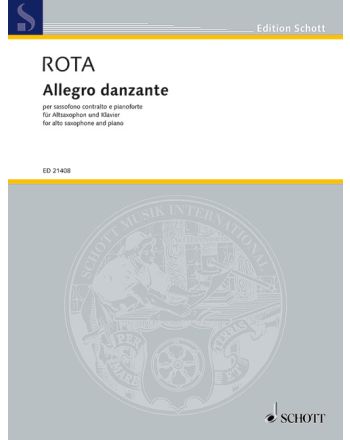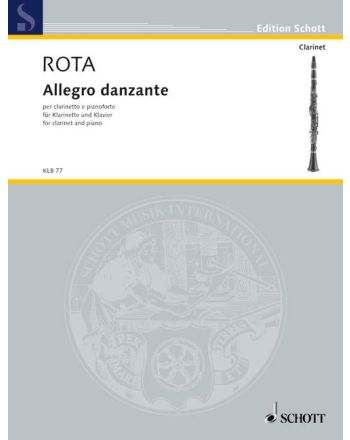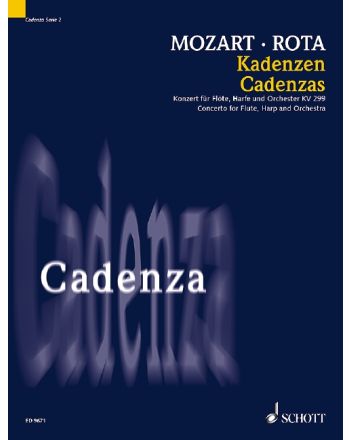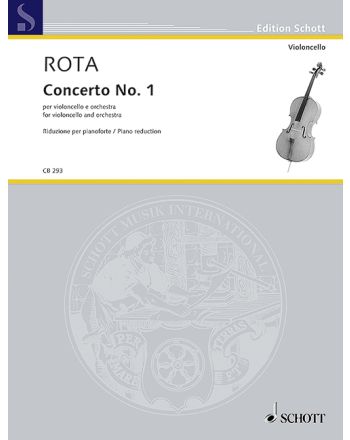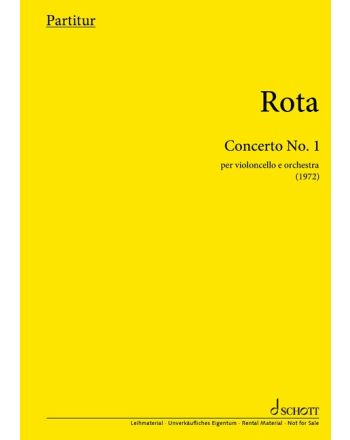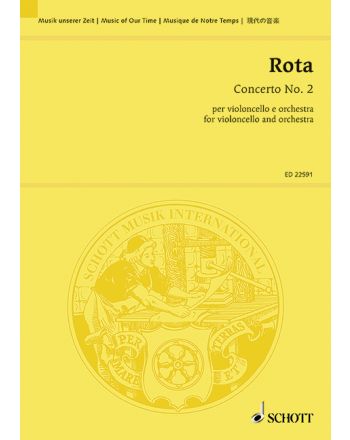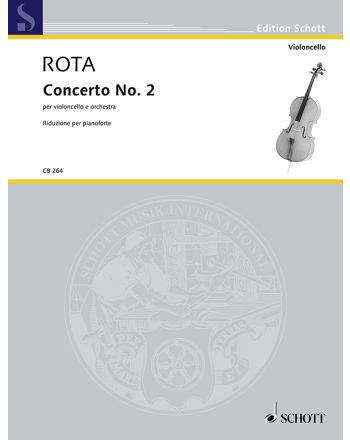
Nino Rota
À venir
À propos de Nino Rota
If anyone reckons that all that I am attempting to express in my music is a little nostalgia and lots of humour and optimism, well that is exactly how I would like to be remembered. (Nino Rota)
Nino Rota was born in Milan on 3 December 1911. He gained a reputation as a child prodigy at the early age of twelve with the performance of the oratorio L’infanzia di San Giovanni Battista which he had composed four years previously. His pianist mother ensured that he received a solid musical education and Rota began studies at the Conservatory in Milan the very same year. In 1925/26, he composed the fairy tale opera Il principe porcaro based on a story by Hans Christian Andersen. Following his studies with Ildebrando Pizzetti, Rota went to Rome in 1926 where he studied at the Santa Cecilia conservatory with Alfredo Casella and received his diploma in piano and composition three years later. Following the recommendation of Arturo Toscanini, he subsequently studied composition (with Rosario Scalero) and conducting (with Fritz Reiner) at the Curtis Institute in Philadelphia from1931 to1932. He made acquaintance with Aaron Copland and developed an interest in American folklore, major Hollywood films and the music of George Gershwin. On his return to Italy, he completed his doctoral thesis in 1937 on the 16th century musicologist Gioseffo Zarlino. Rota was appointed as professor at the Conservatory in Bari in 1939 and director of the same institute in 1950 (until 1977) where one of his most well-known pupils was Riccardo Muti. The composer’s lifelong collaboration with Federico Fellini began in 1952. Rota died in Rome on 10 April 1979; his extensive estate is supervised by the Fondazione Cini in Venice.
Rota attracted the attention of both public and press in the 1930s with chamber music and orchestral works. The composer was a notable imitator of older musical styles. In Rota’s symphonic works, it is the association with Romantic music in the style of Dvorák which particularly comes to the fore, whereas his fascination with Neo-Classical forms can be observed in his chamber music which at times displays a touch of parody.
Rota composed a total of 150 film scores which include compositions for outstanding classics such as Federico Fellini’s La dolce vita (1960), I clowns (1970), Amarcord (1973), Il Casanova di Federico Fellini (1976), Luchino Visconti’s Il Gattopardo (1963), Giulietta degli spiriti (1965) and Francis Coppola’s The Godfather (1972). Rota was ingenious in fulfilling the wishes of film directors, and the success of his film scores cannot merely be attributed to the composer’s extraordinary melodic concepts, but to an equal degree on the direct relationship of the music to the image. Music itself becomes the main theme in Prova d’orchestra (1979), Rota’s final collaboration with Fellini. The deterioration within the sphere of musical life becomes a caricature of modern society.
Rota’s output for concert hall and stage includes ten operas, 23 ballet and stage compositions, three symphonies, three concertos each for piano and cello and a substantial range of choral works and chamber music. The opera Aladino e la lampada magica (1963-65) based on the well-known fairy tale from the “Arabian Nights” received its first performance in Naples in 1968. The ballet suite Le Molière imaginaire (1976-78) is one of Rota’s last major compositions for music theatre. In addition to the film scores which exist in a large variety of arrangements ranging from piano solo to orchestra, it is primarily Rota’s chamber music works such as the Sonata en sol for viola and piano (1970) and the Trio for clarinet, cello and piano (1973) which are currently included in the concert repertoire of numerous musicians.
In 1973, Rota received both a Grammy Award and the Golden Globe for his film score for Coppola’s cinematic work of the century The Godfather. The composer also received an Oscar for the best film music for his score for Part II of The Godfather in 1975.
Liste d'œuvres
Chronologie
Produits
-
for piano four handsCompositeur: Nino RotaArrangeur: Simon BischofEdition: Partition d'exécutionSéries: Edition Schott
15 preludi
Instrumentation: piano à quatre mainsNuméro du produit: ED 23262Type de produitEn stockPrix à partir de 29,99 €TTC -
for pianoCompositeur: Nino RotaSéries: Edition Schott
15 preludi
Instrumentation: pianoNuméro du produit: ED 9386Type de produitEn stockPrix à partir de 18,99 €TTC -
Love ThemeCompositeur: Nino RotaArrangeur: Robert LongfieldMedia Type: PartitionEdition: Partition et partiesSérie: Pop Specials for Strings
Instrumentation: orchestre à cordesLangue: AnglaisNuméro du produit: HL 04491003Format papierFormat papierÉpuisé49,99 €TTC, hors expédition -
Reduced version by Rainer Schottstädt (2003)Compositeur: Nino RotaArrangeur: Rainer SchottstädtMedia Type: Matériel en location / d'exécutionEdition: Matériel d'exécutionLangue: Allemand, ItalienMatériel en location / d'exécutionMatériel en location / d'exécution
-
Original versionCompositeur: Nino RotaMedia Type: Matériel en location / d'exécutionEdition: Matériel d'exécutionLangue: Allemand, ItalienMatériel en location / d'exécutionMatériel en location / d'exécution
-
per orchestra con coro (o organo)Compositeur: Nino RotaMedia Type: Matériel en location / d'exécutionEdition: Matériel d'exécutionLangue: LatinMatériel en location / d'exécutionMatériel en location / d'exécution
-
for saxophone and pianoCompositeur: Nino RotaSéries: Edition Schott
Allegro danzante
Instrumentation: saxophone alto et pianoNuméro du produit: ED 21408Type de produitEn stockPrix à partir de 9,99 €TTC -
pour clarinette et pianoCompositeur: Nino RotaEdition: Partition et partieInstrumentation: clarinette en la ou B et pianoNuméro du produit: KLB 77Type de produitEn stockPrix à partir de 9,99 €TTC
-
Compositeur: Nino RotaMedia Type: Partition électronique en PDFInstrumentation: clarinet in Bb and pianoNuméro du produit: ED 22073 Q42678Partition PDFPartition PDFEn stock3,99 €TTC
-
Full version for the original film restored and arranged by Timothy Brock (2024)Compositeur: Nino RotaMedia Type: Matériel en location / d'exécutionEdition: Matériel d'exécutionInstrumentation: orchestreMatériel en location / d'exécutionMatériel en location / d'exécution
-
Suite per orchestra ridottaMatériel en location / d'exécutionMatériel en location / d'exécution
-
for orchestraMatériel en location / d'exécutionMatériel en location / d'exécution
-
per orchestraCompositeur: Nino Rota | Stelvio CiprianiMedia Type: Matériel en location / d'exécutionEdition: Matériel d'exécutionMatériel en location / d'exécutionMatériel en location / d'exécution
-
Suite from the movie for orchestraMatériel en location / d'exécutionMatériel en location / d'exécution
-
for the Concerto for French Horn an Orchetra in D major KV 412 by Wolfgang Amadeus MozartMatériel en location / d'exécutionMatériel en location / d'exécution
-
for mixed choir a cappellaCompositeur: Nino RotaEdition: Partition de choeurSéries: Schott Choral Music
Audi Judex
Instrumentation: choeur mixte (SATB)Numéro du produit: C 49555Type de produitEn stockPrix à partir de 4,99 €TTC -
Canzone sacra per coro di bambini, violino, viola, violoncello e organoCompositeur: Nino RotaEdition: Partie de choeur, mit OrgelstimmeSéries: Edition Schott
Ave Maria
Numéro du produit: ED 21726-01Type de produitEn stockPrix à partir de 4,99 €TTC -
Canzone sacra per coro di bambini, violino, viola, violoncello e organoCompositeur: Nino RotaEdition: PartitionSéries: Edition Schott
Ave Maria
Numéro du produit: ED 21726Type de produitEn stockPrix à partir de 10,99 €TTC -
for pianoType de produitEn stockPrix à partir de 5,99 €TTC
-
For Piano With Guitar ChordsCompositeur: Nino RotaMedia Type: PartitionEdition: Recueil de pièces instrumentalesSérie: The Best Of (Carisch)
Instrumentation: piano ou orgueNuméro du produit: ML 2194Format papierFormat papierÉpuisé20,99 €TTC, hors expédition -
Transcription for voice or children's choir and chamber orchestra from "Aladino e la lampada magica" (Aladdin and the Magic Lamp)Compositeur: Nino RotaMedia Type: Matériel en location / d'exécutionEdition: Matériel d'exécutionLangue: Allemand, ItalienMatériel en location / d'exécutionMatériel en location / d'exécution
-
to the concerto for piano and orchestra in G Major Hob. XVIII:4Compositeur: Joseph Haydn | Nino RotaSérie: Cadenza, Vol. 3
Instrumentation: pianoNuméro du produit: ED 9901Type de produitEn stockPrix à partir de 8,99 €TTC -
of the concerto for flute, harp and orchestra KV 299Compositeur: Wolfgang Amadeus Mozart | Nino RotaEdition: Jeu de parties solistesSérie: Cadenza, Vol. 2
Instrumentation: flûte et harpeNuméro du produit: ED 9671Type de produitEn stockPrix à partir de 10,99 €TTC -
for chant, trumpet, guitar and organCompositeur: Nino RotaEdition: Partition d'exécutionInstrumentation: soprano ou ténor, trompette en do, guitare et orgueNuméro du produit: ED 9271Type de produitEn stockPrix à partir de 9,99 €TTC
-
for chamber orchestraMatériel en location / d'exécutionMatériel en location / d'exécution
-
for children's or women's choir (SMezA) and organCompositeur: Nino RotaEdition: PartitionSérie: Schott Choral Music
Instrumentation: choeur (SA), (SMezA) et orgueNuméro du produit: C 57828Type de produitEn stockPrix à partir de 8,99 €TTC -
per violoncello e orchestraMatériel en location / d'exécutionMatériel en location / d'exécution
-
Réduction pour piano à quatre mains par l'auteur. Edité par Sara Bartolucci et Rodolfo AlessandriniCompositeur: Nino RotaEditeur: Rodolfo Alessandrini | Sara BartolucciEdition: Partition d'exécutionSérie: Edition Schott
Instrumentation: piano à 4 mainsNuméro du produit: ED 21374Type de produitEn stockPrix à partir de 24,99 €TTC -
Concerto festivo per orchestraMatériel en location / d'exécutionMatériel en location / d'exécution
-
"Piccolo mondo antico"Matériel en location / d'exécutionMatériel en location / d'exécution
-
per violoncello e orchestraCompositeur: Nino RotaEdition: Réduction pour piano avec partie solisteInstrumentation: violoncelle et orchestreNuméro du produit: CB 293Type de produitEn stockPrix à partir de 49,99 €TTC
-
for violoncello and orchestraMatériel en location / d'exécutionMatériel en location / d'exécution
-
pour violoncelle et orchestreCompositeur: Nino RotaEdition: Partition d'étudeInstrumentation: violoncelle et orchestreNuméro du produit: ED 22591Type de produitEn stockPrix à partir de 38,99 €TTC
-
pour violoncelle et orchestreCompositeur: Nino RotaEdition: Réduction pour piano avec partie solisteInstrumentation: violoncelle et orchestreNuméro du produit: CB 264Type de produitEn stockPrix à partir de 27,99 €TTC
-
for violoncello and orchestraMatériel en location / d'exécutionMatériel en location / d'exécution
-
Musiques de l'adaptation radiophonique du récit du même nom d'Adalbert Stifter. Réduction pour piano à quatre mains de l'auteur, éditée par Sara Bartolucci et Rodolfo AlessandriniCompositeur: Nino RotaEditeur: Rodolfo Alessandrini | Sara BartolucciSérie: Edition Schott
Instrumentation: piano à 4 mainsNuméro du produit: ED 21391Type de produitEn stockPrix à partir de 18,99 €TTC -
Musiche per lo sceneggiato radiofonico tratto del racconto omonimo di Adalbert StifterCompositeur: Nino RotaMedia Type: Matériel en location / d'exécutionEdition: Matériel d'exécutionLangue: Allemand, ItalienMatériel en location / d'exécutionMatériel en location / d'exécution
-
female chorus (SA) and organCompositeur: Nino RotaEdition: Partition de choeurSérie: Schott Choral Music
Instrumentation: choeur de femmes (SA) et orgueNuméro du produit: C 53604Type de produitEn stockPrix à partir de 3,99 €TTC -
Canzone profana per canto (S/T) e orchestra da cameraCompositeur: Nino RotaMedia Type: Matériel en location / d'exécutionEdition: Matériel d'exécutionLangue: AllemandMatériel en location / d'exécutionMatériel en location / d'exécution
-
for mixed choir a cappellaCompositeur: Nino RotaEdition: Partition de choeurSéries: Schott Choral Music
Due Mottetti
Instrumentation: choeur mixteNuméro du produit: C 49556Type de produitEn stockPrix à partir de 3,99 €TTC -
for pianoCompositeur: Nino RotaEdition: Edition séparéeSérie: Edition Schott
Instrumentation: pianoNuméro du produit: ED 22707Type de produitEn stockPrix à partir de 8,99 €TTC -
for pianoType de produitEn stockPrix à partir de 10,99 €TTC
-
Suite for orchestraCompositeur: Nino RotaEditeur: Bruno MorettiMedia Type: Matériel en location / d'exécutionEdition: Matériel d'exécutionInstrumentation: orchestreMatériel en location / d'exécutionMatériel en location / d'exécution
-
Suite sinfonicaCompositeur: Nino RotaMedia Type: Matériel en location / d'exécutionEdition: Matériel d'exécutionInstrumentation: orchestreMatériel en location / d'exécutionMatériel en location / d'exécution
-
for orchestraMatériel en location / d'exécutionMatériel en location / d'exécution
-
for three women's voicesCompositeur: Nino RotaEdition: Partition de choeurSérie: Schott Choral Music
Instrumentation: 3 voix de femmes (S)Numéro du produit: C 57825Type de produitEn stockPrix à partir de 5,99 €TTC -
for string quartet, organ and string orchestraMatériel en location / d'exécutionMatériel en location / d'exécution
-
Suite for orchestraMatériel en location / d'exécutionMatériel en location / d'exécution
-
(Juliet of the Spirits)Matériel en location / d'exécutionMatériel en location / d'exécution
-
"Pensiero per Hiroshima"Matériel en location / d'exécutionMatériel en location / d'exécution







